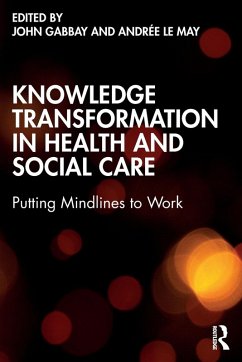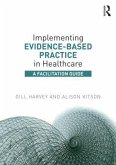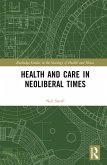The term 'mindlines' has become common currency in the world of research implementation and evidence-based practice. This book updates, develops and applies the mindlines model more widely. It sheds light on how we can realistically mobilise and transform research-based evidence into practice in context.
This illuminating book shows how the mindlines model can be put to work. It highlights how practitioners collectively share and internalise implicit, flexible ways of rapidly handling complex clinical situations. Drawing on research and reflective studies from practice, education, and guidelines-development across a wide range of international health and care settings, the authors unpack the general components of mindlines. They find practical ways to uncover, bring together and apply specific mindlines to improve practice; and to develop evidence-based healthcare policy, practice and education in ways that capitalise on the crucial role of mindlines. Closelyedited by the originators of the mindlines model, this book brings together the work of a cohesive group of researchers and practitioners to showcase and develop its theory and consequences.
It is an essential read for all those interested in knowledge mobilisation, evidence-based practice, and research implementation both within healthcare and beyond.
This illuminating book shows how the mindlines model can be put to work. It highlights how practitioners collectively share and internalise implicit, flexible ways of rapidly handling complex clinical situations. Drawing on research and reflective studies from practice, education, and guidelines-development across a wide range of international health and care settings, the authors unpack the general components of mindlines. They find practical ways to uncover, bring together and apply specific mindlines to improve practice; and to develop evidence-based healthcare policy, practice and education in ways that capitalise on the crucial role of mindlines. Closelyedited by the originators of the mindlines model, this book brings together the work of a cohesive group of researchers and practitioners to showcase and develop its theory and consequences.
It is an essential read for all those interested in knowledge mobilisation, evidence-based practice, and research implementation both within healthcare and beyond.
"In the history of ideas, every now and again an evocative concept bursts into existence and captures the zeitgeist of the era. I vividly recall thinking that when I first read the original paper by John Gabbay and Andrée le May in the British Medical Journal not long after it was published in May 2004... Now, in Knowledge Transformation in Health and Social Care, luminaries in the field have come together to give further texture to the mindlines concept and to explicate their understanding of it in different contexts. It follows their earlier book, Practice-Based Evidence in Healthcare: Clinical Mindlines, but now broadens our appreciation of this concept. This book is a must-read for anyone seriously interested in expanding their own horizons about how knowledge is created, replicated and applied, and how to influence and shape knowledge happenings, flows, processes, contexts and outcomes."
- Jeffrey Braithwaite, PhD, FIML, FCHSM, FFPHRCP, FAcSS, Hon FRACMA, FAHMS
"This rich and insightful volume edited by John Gabbay and Andree le May adds new depth to their original model of `mindlines' or how knowledge gets into practice. Combining perspectives from clinical practice, education and epistemology, this is an accessible and stimulating read for scholars and practitioners alike."
- Tara Lamont, University of Southampton
"A beautifully-written antidote to the reductive depiction of clinical practice as rational, algorithm-based decision science, this new book offers a wealth of detailed examples on the concept of mindlines-collectively shared, continuously evolving, embodied and enacted knowledge - that explain much of the gap between the evidence-based ideal and the practical realities of clinical practice."
- Trish Greenhalgh, Professor of Primary Care Health Sciences and Fellow of Green Templeton College at the University of Oxford
"[This book] stands as one of the most groundbreaking and revolutionary concepts in 21st-century health services research [...] it offers an updated model, synthesizing extensive research inspired by mindlines. With its accessible language and unwavering commitment to advancing knowledge, this book is an absolute must-read for anyone interested in evidence-based practice."
- Roman Kislov, Professor of Health Policy and Management at Manchester Metropolitan University
"[Gabbay and le May's] latest book brings together rich examples of mindlines-oriented research, education and practice that continue to highlight the vital role of complex, internalised wisdom in health and social care. It is a timely reminder that no-one can simply 'follow the science' and is a must-read for anyone seeking to explore how knowledge is learned and put into practice.
- Vicky Ward, Director of Impact and Co-Director of the Research Unit for Research Utilisation at the School of Management
"This authoritative book recognises and celebrates the scholarship of everyday professional practice and so contributes to driving the changes we so urgently need. It offers ideas and inspiration to those engaged in modernising healthcare; and provides challenges to the politicians and policy makers engaged in healthcare redesign. Most of all, to the front-line clinicians caught in a model of healthcare delivery that isn't working, it offers hope."
- Joanne Reeves, Professor of Primary Care Research at Hull York Medical School
"There are few concepts as useful to a reflective clinician or health care educator than 'mindlines.' first coined by these editors in 2004. [...] In Knowledge Transformation in Health and Social Care, John Gabbay and Andrée Le May and their contributors take this radical project to a new level by showing how different varieties of knowledge actually permeate practice in a range of settings in the real world."
- John Launer, Programme Director for Educational Innovation, Health Education England, London
The original book on Mindlines (Gabbay and le May 2011) broke new ground by unravelling the complexities of the interplay between research and a wide range of other factors in practice. It was both ahead of its time and a great read. What a treat to see this work revisited and elaborated with examples drawn from a diverse set of health care contexts and beyond. While our collective understanding of evidence use has undoubtably moved forward in the past ten years there is still so much to do in fully deploying this understanding to improve evidence use in practice. There is a challenge for us all to put mindlines to work in support of healthcare (and wider service) improvement. One important change in the landscape - the growing acknowledgment of the relational work involved in evidence use - may well make it possible for mindlines to play a more central role going forwards. With this in mind I would recommend adding this edited collection to the 'must read' list.
- Annette Boaz, Professor of Health and Social Care Policy, London School of Hygiene and Tropical Medicine and Transforming Evidence
"In their new book John Gabbay and Andrée le May have advanced our thinking with the curation of an excellent repository of international case studies on the practical application of Mindlines, theory and knowledge mobilisation. [...] The Mindlines Model is described as 'in itself a contextually rooted socially constructed' model. Deep observations and analysis explain the balancing of patient Mindlines and complex clinical practices. This is the go-to text for advancing our progress and thinking in this discipline."
- Krysia Dziedzic, Impact Accelerator Unit in Keele University's School of Medicine
"This rich and absorbing volume brings together a range of perspectives from scholars in many specialties who have applied the lens of mindlines to different branches of practice, education, and knowledge. [...] The most fascinating chapters for me were on guidelines, with a stand-out contribution from Sietse Wieringa which includes some original ethnographic research on how committees develop national guidelines."
- Tara Lamont, Senior Scientific Adviser, NIHR Coordinating Centre, Southampton University
- Jeffrey Braithwaite, PhD, FIML, FCHSM, FFPHRCP, FAcSS, Hon FRACMA, FAHMS
"This rich and insightful volume edited by John Gabbay and Andree le May adds new depth to their original model of `mindlines' or how knowledge gets into practice. Combining perspectives from clinical practice, education and epistemology, this is an accessible and stimulating read for scholars and practitioners alike."
- Tara Lamont, University of Southampton
"A beautifully-written antidote to the reductive depiction of clinical practice as rational, algorithm-based decision science, this new book offers a wealth of detailed examples on the concept of mindlines-collectively shared, continuously evolving, embodied and enacted knowledge - that explain much of the gap between the evidence-based ideal and the practical realities of clinical practice."
- Trish Greenhalgh, Professor of Primary Care Health Sciences and Fellow of Green Templeton College at the University of Oxford
"[This book] stands as one of the most groundbreaking and revolutionary concepts in 21st-century health services research [...] it offers an updated model, synthesizing extensive research inspired by mindlines. With its accessible language and unwavering commitment to advancing knowledge, this book is an absolute must-read for anyone interested in evidence-based practice."
- Roman Kislov, Professor of Health Policy and Management at Manchester Metropolitan University
"[Gabbay and le May's] latest book brings together rich examples of mindlines-oriented research, education and practice that continue to highlight the vital role of complex, internalised wisdom in health and social care. It is a timely reminder that no-one can simply 'follow the science' and is a must-read for anyone seeking to explore how knowledge is learned and put into practice.
- Vicky Ward, Director of Impact and Co-Director of the Research Unit for Research Utilisation at the School of Management
"This authoritative book recognises and celebrates the scholarship of everyday professional practice and so contributes to driving the changes we so urgently need. It offers ideas and inspiration to those engaged in modernising healthcare; and provides challenges to the politicians and policy makers engaged in healthcare redesign. Most of all, to the front-line clinicians caught in a model of healthcare delivery that isn't working, it offers hope."
- Joanne Reeves, Professor of Primary Care Research at Hull York Medical School
"There are few concepts as useful to a reflective clinician or health care educator than 'mindlines.' first coined by these editors in 2004. [...] In Knowledge Transformation in Health and Social Care, John Gabbay and Andrée Le May and their contributors take this radical project to a new level by showing how different varieties of knowledge actually permeate practice in a range of settings in the real world."
- John Launer, Programme Director for Educational Innovation, Health Education England, London
The original book on Mindlines (Gabbay and le May 2011) broke new ground by unravelling the complexities of the interplay between research and a wide range of other factors in practice. It was both ahead of its time and a great read. What a treat to see this work revisited and elaborated with examples drawn from a diverse set of health care contexts and beyond. While our collective understanding of evidence use has undoubtably moved forward in the past ten years there is still so much to do in fully deploying this understanding to improve evidence use in practice. There is a challenge for us all to put mindlines to work in support of healthcare (and wider service) improvement. One important change in the landscape - the growing acknowledgment of the relational work involved in evidence use - may well make it possible for mindlines to play a more central role going forwards. With this in mind I would recommend adding this edited collection to the 'must read' list.
- Annette Boaz, Professor of Health and Social Care Policy, London School of Hygiene and Tropical Medicine and Transforming Evidence
"In their new book John Gabbay and Andrée le May have advanced our thinking with the curation of an excellent repository of international case studies on the practical application of Mindlines, theory and knowledge mobilisation. [...] The Mindlines Model is described as 'in itself a contextually rooted socially constructed' model. Deep observations and analysis explain the balancing of patient Mindlines and complex clinical practices. This is the go-to text for advancing our progress and thinking in this discipline."
- Krysia Dziedzic, Impact Accelerator Unit in Keele University's School of Medicine
"This rich and absorbing volume brings together a range of perspectives from scholars in many specialties who have applied the lens of mindlines to different branches of practice, education, and knowledge. [...] The most fascinating chapters for me were on guidelines, with a stand-out contribution from Sietse Wieringa which includes some original ethnographic research on how committees develop national guidelines."
- Tara Lamont, Senior Scientific Adviser, NIHR Coordinating Centre, Southampton University








